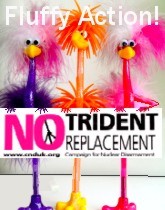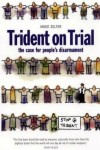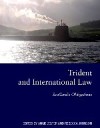Trident costs billions and what is it for?
If Trident is replaced it will cost over £100 billion to build and run. Britain doesn’t need nuclear weapons. They can’t actually be used. They don’t defend us or deter wars or terrorist attacks. If the government launched the 40-48 nuclear weapons carried on one Trident submarine it would incinerate millions of people. Even the use of one Trident warhead would violate international law and make our government guilty of crimes against humanity. Military leaders don’t want the Ministry of Defence to spend its budget on Trident as they know nuclear weapons can’t keep us safe or secure. The billions that would be wasted on replacing Trident would be far better spent on our real security needs, like health, education and social services.
Nuclear weapons are immoral and inhumane
When the Japanese cities Hiroshima and Nagasaki were bombed in 1945 the world saw that just one nuclear bomb can destroy a whole city and then spread deadly radioactivity to keep on killing and poisoning people across the generations, through cancer, immune deficiencies, and birth defects.
The UK government’s plans are for at least 160 nuclear weapons, most of which are designed to explode with at least 6 times greater explosive force than the Hiroshima bomb. The blast, heat and fire if just one British warhead exploded would cause hundreds of thousands of people to die straight away. Radiation poisoning would also cause genetic damage, harming the health of future generations. But that is not all.
Nuclear Famine and Environmental Destruction – Nuclear Weapons threaten life on Earth
In 1996, the International Court of Justice recognised that nuclear weapons “have the potential to destroy all civilization and the entire ecosystem of the planet. The radiation released by a nuclear explosion would affect health, agriculture, natural resources and demography over a very wide area. Further, the use of nuclear weapons would be a serious danger to future generations. Ionizing radiation has the potential to damage the future environment, food and marine ecosystem, and to cause genetic defects and illness in future generations.”
Updating the 1980s “nuclear winter” studies that showed that an all out nuclear war would turn the Earth into a barren, frozen wasteland, climate scientists and doctors have discovered that if even a small fraction of today’s nuclear arsenals were used against cities nowadays, millions of people would starve. This is because tons of soot, smoke and debris would be pushed high into the atmosphere by huge mushroom clouds and pillars of fire. While some of this would fall out as radioactive rain, most would remain circulating in the upper atmosphere for a long time, blotting out the sun and darkening our skies. Not just for days, but for months and years, depending on how many nuclear weapons were used and how large the cities that were destroyed. The dust clouds would cause temperatures around the world to drop abruptly and cause darker, colder extremes of weather that could last for years. The climate change would cause havoc for agriculture and ecosystems, causing famine on a scale the world has never experienced. Even if a nuclear war were “limited” to just one region, the humanitarian and environmental effects would be catastrophic around the world, putting a billion lives at risk from starvation.
A “nuclear famine” on such a global scale could be caused by unleashing the nuclear weapons carried on just one of Britain’s Trident submarines. In addition, the radioactive fallout would contaminate the most affected areas for tens of thousands of years, making them virtually uninhabitable. And every warhead carried by Trident is made at AWE Aldermaston and Burghfield.
Trident warheads are a danger to local lives and homes
Convoys of trucks carrying Trident’s nuclear warheads are frequently transported by road from Burghfield to the MoD’s warhead storage base at Coulport, about 40 miles from Glasgow in Scotland. Travelling on the M4, M25, M1 and other major roads, these nuclear warhead convoys pose serious risks to people and other vehicles along the route. In the past the warhead carriers have broken down, slipped off the road in icy conditions, been close to accidents and fires involving other vehicles, and had several near misses.
There have also been some severe fires and flooding at the AWE Aldermaston and Burghfield facilities
Nuclear weapons are criminal if used but they are not yet legally banned
As noted by the International Court of Justice, using nuclear weapons would be generally unlawful because they are indiscriminate, disproportionate and inhumane. Nuclear weapons cannot be used against combatants without also killing many civilians, including children. Because of the toxic radiation and risks of nuclear famine, the destructive power of nuclear weapons cannot be contained in space or time. Therefore using Trident would violate international humanitarian law and constitute a crime against humanity and war crime. Since detonating nuclear weapons near people would be illegal, threatening to use them against other countries would also be illegal. So deploying Trident is illegal and pointless. Yet under the rubric of “nuclear deterrence”, the UK deploys at least one nuclear-armed submarine at sea at all time, with doctrines and operations for how Trident would be used. This constitutes an ever-ready threat to use these weapons of mass destruction, contrary to international humanitarian law.
Many countries are now leading the way to ban nuclear weapons
In 2010, over 140 of the world’s nuclear-free countries advocated a treaty to ban and eliminate nuclear weapons. Such a treaty is sometimes called a “nuclear weapons convention”, as Biological and Chemical Weapons Conventions have already banned these other weapons of mass destruction. Now it is time for the most inhumane weapons of all to be banned.
At a major international conference at the UN in 2010, 189 states that are parties to the 1968 Nuclear Non-Proliferation Treaty (NPT) – including Britain, China, France, Russia and the United States – expressed their “deep concern at the catastrophic humanitarian consequences of any use of nuclear weapons”. They called “on all nuclear-weapon states to undertake concrete disarmament efforts” and said that “all states need to make special efforts to establish the necessary framework to achieve and maintain a world without nuclear weapons”. The Conference especially noted “the five-point proposal for nuclear disarmament of the Secretary-General of the United Nations, which proposes, inter alia, consideration of negotiations on a nuclear weapons convention or agreement on a framework of separate mutually reinforcing instruments, backed by a strong system of verification.”
In 2012, a group of countries that includes Norway, South Africa, Mexico, Indonesia, Ireland, Switzerland, Nigeria and Chile, have taken the first steps towards starting multilateral negotiations on a treaty to ban nuclear weapons. Working closely with these governments, and bringing together many disarmament and humanitarian campaigns around the world, the International Campaign to Abolish Nuclear Weapons (ICAN) is gaining strength.


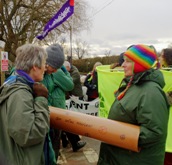





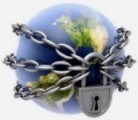



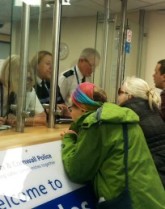 Nuclear weapons crime in the UK has been reported to Thames Valley Police.
Nuclear weapons crime in the UK has been reported to Thames Valley Police.